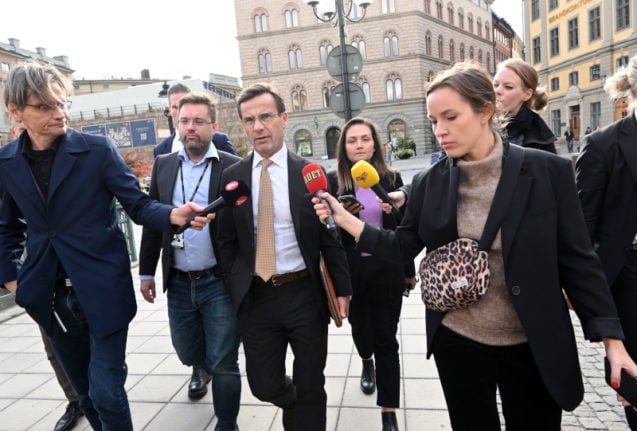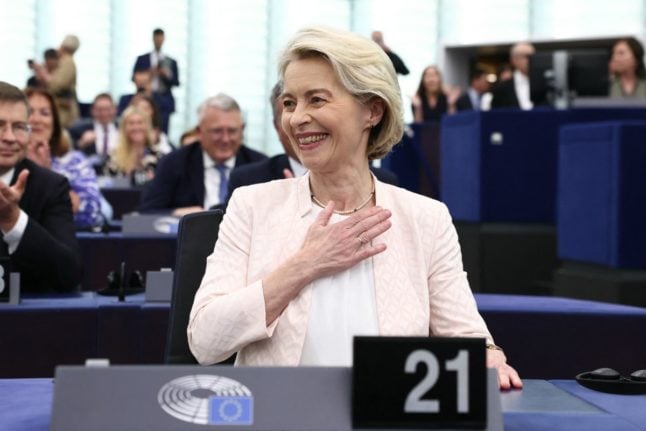Hej,
It’s been a month since his right-wing bloc beat the left bloc by three seats, and Sweden’s presumptive next prime minister is conspicuously quiet.
Ulf Kristersson’s Wednesday deadline for producing a viable potential government in his next meeting with the speaker of parliament (who will then put that to a vote in parliament) is looming closer and closer.
But so far, there’s been little sign of a breakthrough in negotiations between the right-wing parties (which of course doesn’t mean that it isn’t forthcoming; the party leaders could just be uncharacteristically quiet).
Kristersson wrote on Facebook last Wednesday that “negotiations between the Moderates, Sweden Democrats, Christian Democrats and Liberals remain constructive and are progressing according to plan – but also, nothing is done until it’s all done”. One might however wonder if the slower-than-expected talks do not indicate a slight snag in the plan.
He’s still within deadline for now and won’t have to show his cards until Wednesday, but Swedish media report that the four parties are finding it difficult to retrieve the common ground on which they campaigned.
Sweden’s public radio broadcaster’s news programme Ekot reports that the Liberals are insistent on getting ministerial portfolios in a Moderate-Christian Democrat-Liberal government, but the Sweden Democrats are equally insistent on not allowing their liberal nemesis-or-partners-it’s-not-really-clear to be in government. We can’t have it, so you can’t either.
Why is Kristersson digging his heels in for the Liberals, the smallest party in parliament? Well, since the margins are so tight, even the Liberals’ 16 seats are important. The party is split on whether or not it’s happy to be part of the same bloc as the Sweden Democrats, and being elevated to government status will make it easier to keep their members in line. The last thing Kristersson needs is for rebelling Liberals to vote against him.
The Dagens Nyheter newspaper reports that another point of contention that has emerged is the question of whether the Sweden Democrats should be allowed to have some of their party officials based in the government building rather than the parliament building.
The benefit for the Sweden Democrats would be shorter routes to liaising with the government; those who oppose it would argue that working from the government offices is traditionally reserved for, well, the government.
So what happens if Kristersson does not manage to bring these four parties together in time for his next meeting with the speaker this week?
The speaker then has three choices. He could extend the deadline, or pick a new person to try to cobble together a government (I wouldn’t want the job, but you’d better believe the outgoing Social Democrat Prime Minister Magdalena Andersson is waiting in the wings), or put Kristersson to a vote in parliament to at least give him a fair shot at success or humiliation.
Those of you who were around for Sweden’s record-long government formation in 2018 (which took 134 days, so there’s an argument that I should stop complaining and give Kristersson a break) may remember this, but the speaker has four shots at putting a prime ministerial candidate to a vote in parliament.
If no one is successful, a snap election must be held within three months. Hey, at least I would get to keep writing this newsletter, and we’re all having a lot of fun together, aren’t we!
A candidate passes a prime ministerial vote by having no more than 175 votes against them, so abstentions effectively count as votes in favour.
Even if Kristersson fails and the baton gets passed to Andersson, would she be able to form a left-wing coalition with enough support from parliament? As Swedes would say, nja. Her current allies in the Left, Centre and Green parties don’t hold enough seats, so the only way she’d win majority support is if the Liberals shuffle awkwardly back across the aisle to join the left, and that’s a dance they may have done too many times.
What about Jimmie Åkesson, whose Sweden Democrats are the largest party on the right? Good luck.
Anyway. The other interpretation of the silence from the right-wing bloc is that talks are in fact progressing well, which I base on the reasoning that there would be a lot more backstabbing in the media if they weren’t.
We’ll know in two days, if not sooner.
Best wishes,
Emma
Sweden Elects is a weekly column by Editor Emma Löfgren looking at the big talking points and issues in the Swedish election race. Members of The Local Sweden can sign up to receive the column as a newsletter in their email inbox each week. Just click on this “newsletters” option or visit the menu bar.



 Please whitelist us to continue reading.
Please whitelist us to continue reading.
Member comments